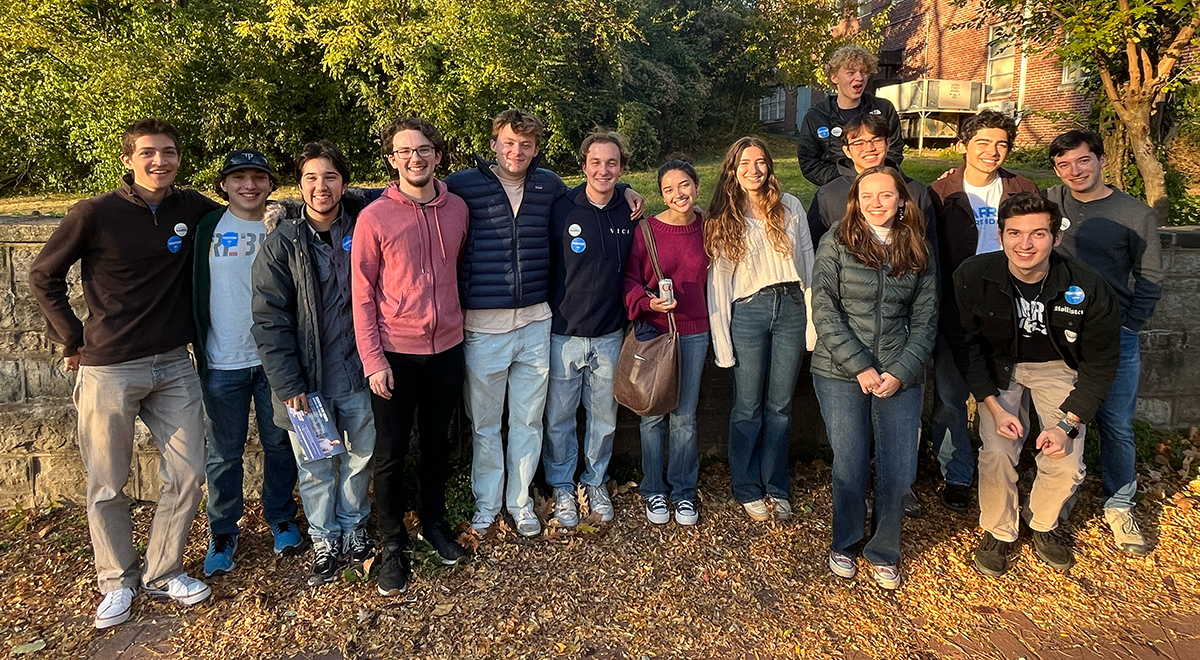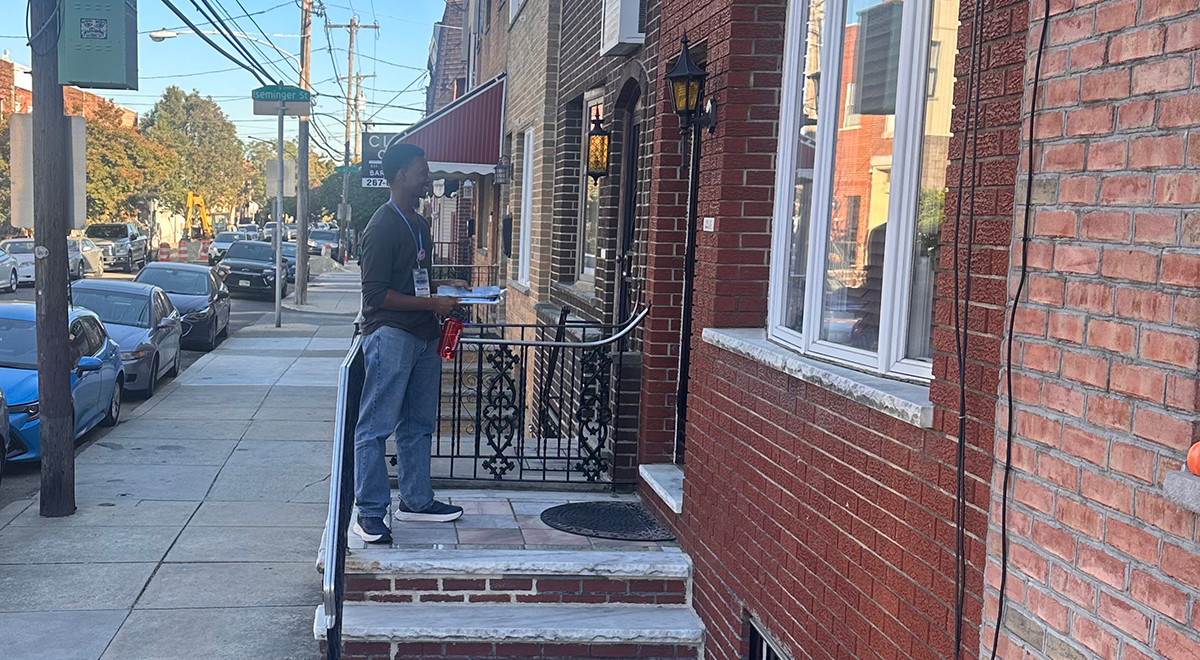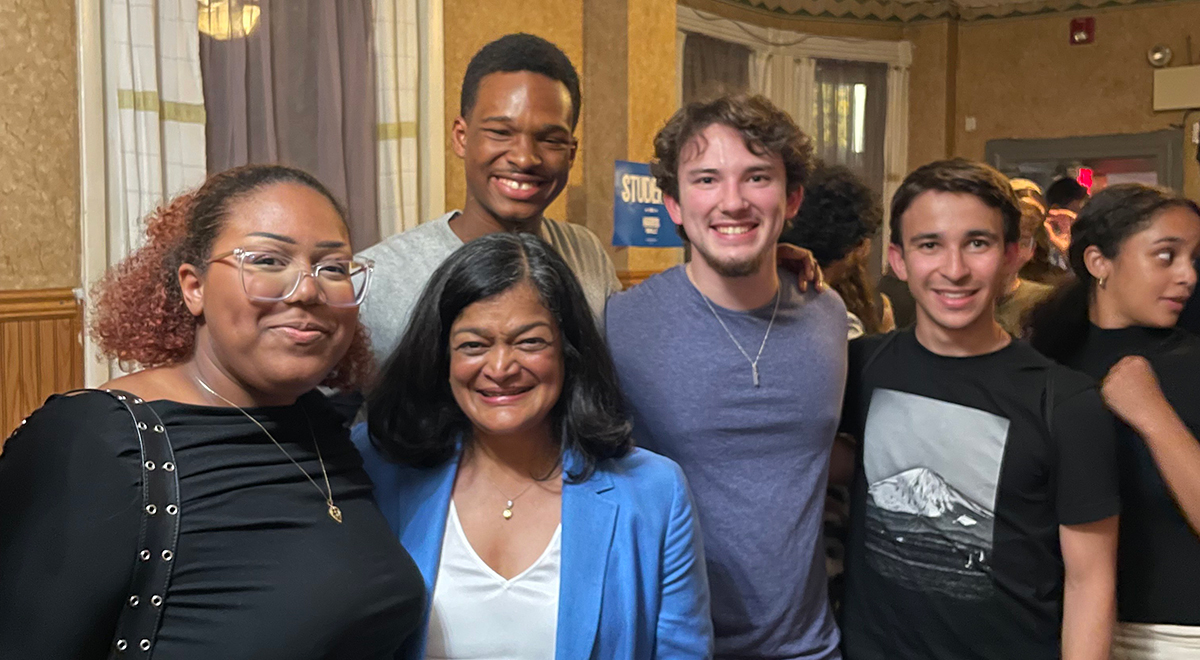Wesleyan Students Canvass Voters in Key Swing State

For many, the ideal of democracy lies in the concepts of government by the people and the rule of the majority. While this is a significant part of what makes a democracy work, or fail, the discourse surrounding elections plays a key role, too, said Xander Starobin ’27. In the weeks leading up to Election Day, Starobin and dozens of other Wesleyan students have taken action to strengthen democracy, canvassing in states that could define this year’s election, and the country, going forward.
“To be able to go canvass—which is directly talking to people about what people are concerned about, about their real lives, about real communities and real issues that matter to people—I think is a really profound thing to be able to do,” Starobin said. “I think it’s in service of the highest ideals of what democracy is really all about.”
A few groups of Wesleyan students went to Pennsylvania to knock on the doors of the potential voters who may decide the election on Nov. 5. Many of the students received funding for their trips through the Allbritton Center for the Study of Public Life’s Political Engagement Fund, which provides grants for students working on campaigns, voting registration efforts, and advocacy work. Funding was used for transportation, living costs, and supplies, which proved crucial to making sure these efforts came together, according to the students.
“[The grant] enabled us to just get as many people involved as possible,” said Luca D’Agruma ’27, who intends to major in history. He led a coalition of 17 students to campaign on behalf of Vice President Kamala Harris and the Pennsylvania Democratic Party in Allentown, Bethlehem, and Easton, Penn. He also led smaller groups on a handful of canvassing trips in New Britain, Conn. on behalf of Rep. Jahana Hayes in Connecticut’s 5th Congressional District.
D’Agruma has been involved in politics for several years and served California’s 24th Congressional District as a delegate to the Democratic National Convention this past summer, which he recounted in a piece in Wesleyan University Magazine. This semester, he started by getting students registered to vote and helping them request absentee ballots at frequent tabling events. Then the group he co-leads, Wes for Harris, decided it needed to start talking to voters, so they applied for the Political Engagement Fund grant. The group knocked on 1,200 doors over two days in Pennsylvania, he said.
“I wanted to get Wesleyan students involved with national races,” D’Agruma said, “because I think that it impacts us and we have to realize that we can do something about it, and we can make an impact. It’s not about what one person can do, one person isn’t going to elect a president; it’s the aggregate.”

The conversations canvassing groups had with voters were largely geared toward voter participation efforts—making sure registered voters had a plan to vote and providing information about where and how to vote—but there was some work done to reach individuals across the political divide. Nathan Weisbrod ’25, who led a group of canvassers in the Philadelphia area in mid-October, said there were many people he spoke to who vehemently disagreed with his positions, but he said he took the opportunity to hear their perspectives and understand where they were coming from.
“I learned a lot more about communicating with people who view political and social issues differently than I do,” Weisbrod said.

Celeste McKenzie ’27, a member of Weisbrod’s canvassing group, had initially turned down the opportunity to canvass. In a piece she wrote for Harper’s Bazaar about the experience, she said she was apprehensive at first.
“It was almost absurd: me, a Black teenage girl, strolling around Philadelphia on the weekend, asking random strangers whom they were planning on voting for, when most of the time I didn’t even want to ask my own family that question,” McKenzie wrote.
Eventually McKenzie agreed to engage. After a while she knocked on a door of a woman who wanted to vote by mail but was not sure how. She gave the woman the appropriate information, helping to secure the participation of one more voter—this was also likely the last day a mail-in vote could reasonably be sent and counted in time for the election, McKenzie said.
“That was one additional vote that may not have been able to happen had we not been there,” McKenzie said. “So that was a tangible thing that made me realize, ‘wow, what we’re doing is important and is actually making a difference.’”
Not only did McKenzie and the other canvassers take the time to make an impact on voter engagement and democracy, they all said they left the experience with a broader understanding of the world and a desire to continue working in the public sphere in some way. McKenzie even said she might want to move to a swing state someday.

